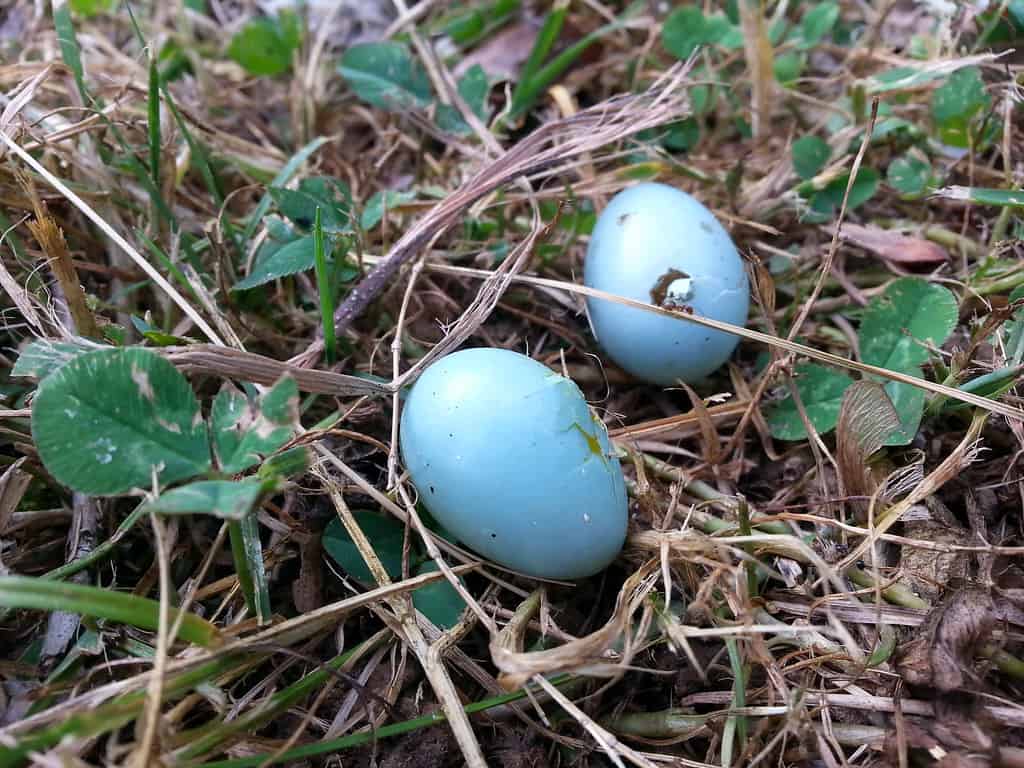
One of the most frustrating experiences as a bluebird landlord is having bluebirds abandon their eggs. Everything seems to be going well, so when something like this happens, it’s really puzzling. While it may be disheartening or confusing in the moment, just know that there is probably a reasonable explanation as to why your bluebirds abandoned their eggs.
The above photo by Lisa Zins is licensed under CC BY 2.0
Why do Bluebirds Abandon Their Eggs?
As a general rule, bluebirds abandon their eggs for one of the following reasons: the eggs are unfertilized, the eggs become overheated and/or destroyed by predators, the eggs are poorly incubated, or one of the adult bluebirds dies and the other can’t manage caring for the eggs alone.
In this article, I want to go over these possible scenarios one by one so we can understand them a little better. I’ll also give advice on whether or not there’s anything you can do to help your bluebirds in these situations.
Pro Tip: There are only two types of bluebird houses that I use and recommend, check them out here.
Reasons That Bluebirds Abandon Their Eggs
1. The Eggs Are Unfertilized
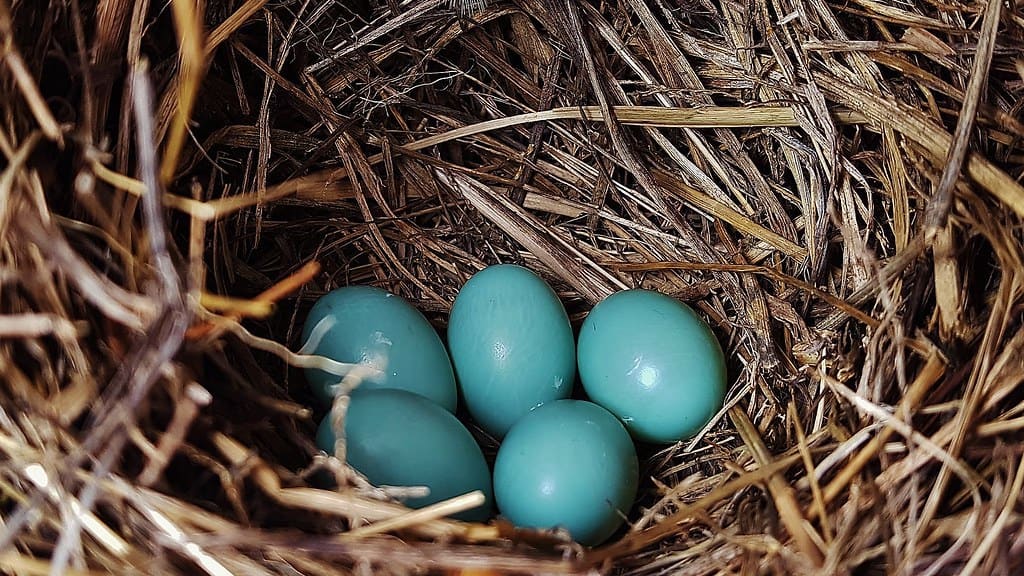
Just like with humans, on occasion, one or both adult bluebirds can suffer infertility. In these cases, the pair might build a nest, lay and incubate eggs, wait, wait, and wait, and nothing happens. When the bluebirds eventually realize that the eggs aren’t viable, they will either throw the eggs out of the nest and abandon them, or they might even build a new nest right on top of the unfertilized eggs and start over (source).
If the bluebirds do attempt a new nest, and indeed they are infertile, they’ll likely get the same result. They’ll realize the eggs are not viable and they’ll abandon them. They may continue trying at your nest box at this point, or move on to a new site. Unfortunately, there’s nothing you can do to help your bluebird eggs hatch in this scenario. That’s just life.
If just the male is infertile, some or all of the eggs might still hatch if they are fertilized by another male. Both male and female bluebirds occasionally have multiple breeding partners, so this is possible.
Overall, if bluebirds abandon their entire nest of eggs and start over, one of the possible reasons is infertility.
2. One Or Both Adult Bluebirds Pass Away

One of the saddest reasons that bluebirds abandon their eggs is if something unfortunate happens to one or both of the adult birds. Life happens, and with cars, cats, hawks, and natural predators, there are plenty of reasons why a bluebird might suddenly disappear.
The Male Bluebird
If the male bluebird passes away, the female might successfully fledge the young bluebirds on her own, but this is more difficult the younger the birds are and especially if they are still unhatched eggs. It is possible that the female will abandon the eggs to find a new partner. It’s even likely that she will find a new partner and they will choose to build a new nest on top of the old eggs to start over.
If you notice that you haven’t seen the male bluebird in a long time, and you are certain that the female is raising the young on her own, I suggest supplementing her food so it will be easier for her to feed the hungry young birds. Try offering live mealworms and suet at a platform feeder to help her out. Here’s a list of the feeders I recommend and sources for where to get live mealworms.
The Female Bluebird
If the female bluebird passes away, the male may try to raise the young on his own, but he is physically incapable of incubating the eggs. So, if the female disappears while there are still eggs on the nest or if the babies are still very young, the adult male bluebird will likely abandon the eggs or nest. He might find a new partner and continue raising the young with her, but it’s common that the new couple would abandon the nest to start fresh (source).
In the event that the female bluebird disappears when the babies are older, there’s a chance that they’ll make it. The male might keep feeding them. If you haven’t seen the female in a long while and see the male feeding the young, help him out with some mealworms. Offer live mealworms and suet in a platform feeder to supplement their diet and increase their chance of success.
3. The Eggs Overheat
Another reason that bluebirds abandon their eggs is if the eggs overheat. In some nest boxes and natural cavities, overheating becomes an issue during the summer months. If the nest box becomes too warm, above 107°F, the eggs and nestlings cannot survive (source). At this point, the bluebirds will realize the eggs are no longer viable and start over or move to a new nesting site. That is why nest box ventilation is so important, especially in warmer climates.
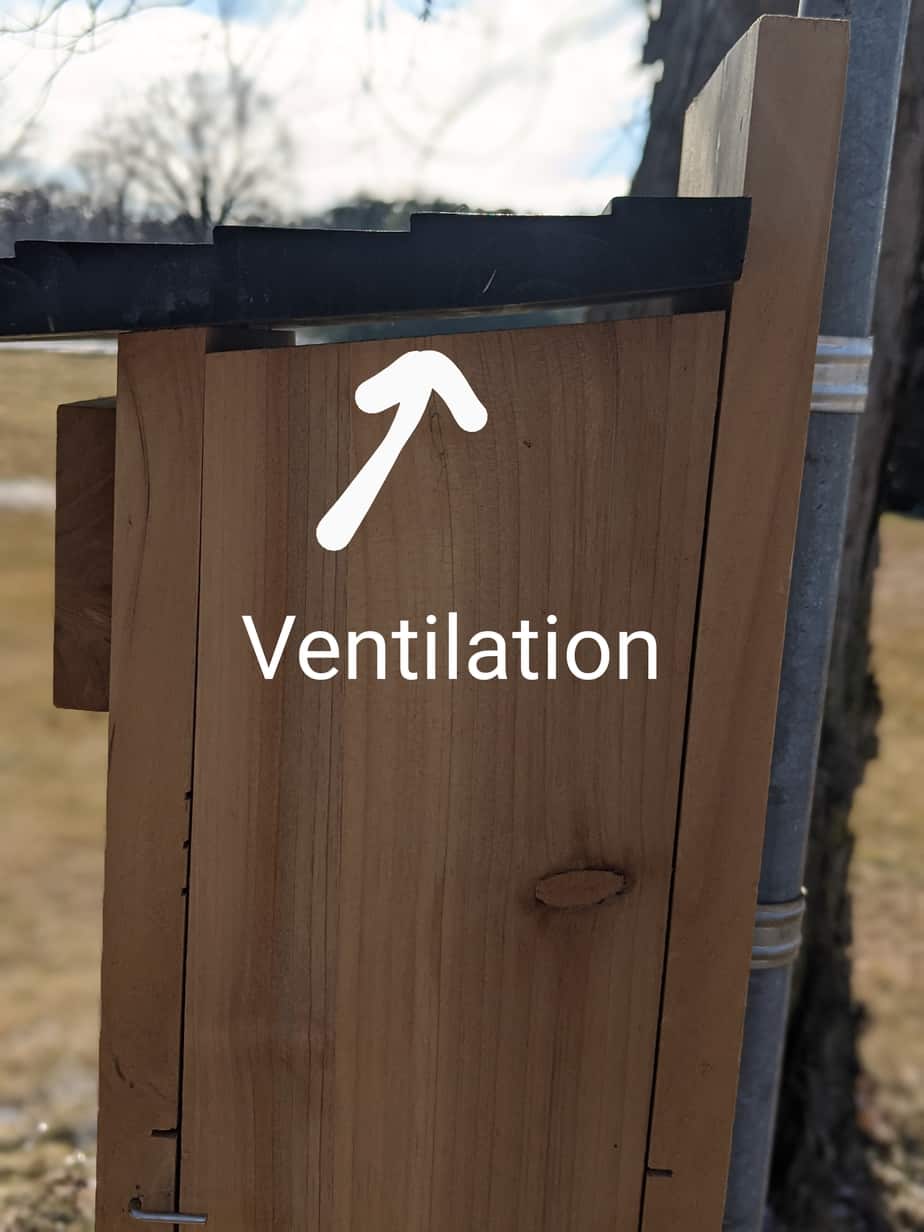
The particular nest box that I recommend has two ventilation slots at the top of the sides of the box that are designed to prevent overheating (see this nest box on my Recommended Tools page). When you’re choosing a nest box, make sure it has proper ventilation slots at the top of the box. And if you’re building your own nest box, be sure to build in proper ventilation. Click here to view my nest box plans.
4. The Eggs Are Destroyed By Predators Or Other Birds
Bluebirds are the target of a few different predators in their natural environment, so that brings us to abandonment reason #4. Bluebirds might abandon their eggs if some or all of the eggs are destroyed by predators or other birds.
Cats, Racoons, and Snakes

These three animals – cats, racoons, and snakes – are the three main predators bluebirds face in the average backyard. Cats, obviously, love to catch any kind of bird, and they are mostly a danger to adult bluebirds. But racoons and snakes will actually reach into the nest box and devour bluebird nestlings and eggs, if given the chance. If a racoon or a snake turns your nest full of bluebird eggs into their next meal, the pair of bluebirds will likely abandon the nest.
To avoid problems with snakes, racoons, and cats, make sure that you mount your nest box on a metal pole instead of on a wooden post or tree. Wood is easy to climb and predators will take advantage of that. In addition to mounting the nest box on a metal pole, consider adding a stovepipe-style baffle on the pole. These work wonders for deterring racoons and snakes. You can look up how to build one of these baffles online, or buy one from a good retailer. Here is a great one from Songbird Essentials.

to deter racoons and snakes.
Other Birds
While they are not technically predators of bluebirds, house sparrows and house wrens will occasionally destroy bluebird eggs too. If this happens, the bluebirds might abandon their eggs.
How House Sparrows Cause Abandoned Eggs

House sparrows are a non-native species in North America and today they are bluebirds’ number one competitor for nest boxes. They are also highly territorial and act very aggressively toward bluebirds, often crushing their eggs and killing their young. If sparrows destroy your bluebirds’ eggs, it’s likely the bluebirds will abandon the eggs and seek a new nesting site.
The same thing can happen with house wrens.
How House Wrens Cause Abandoned Eggs
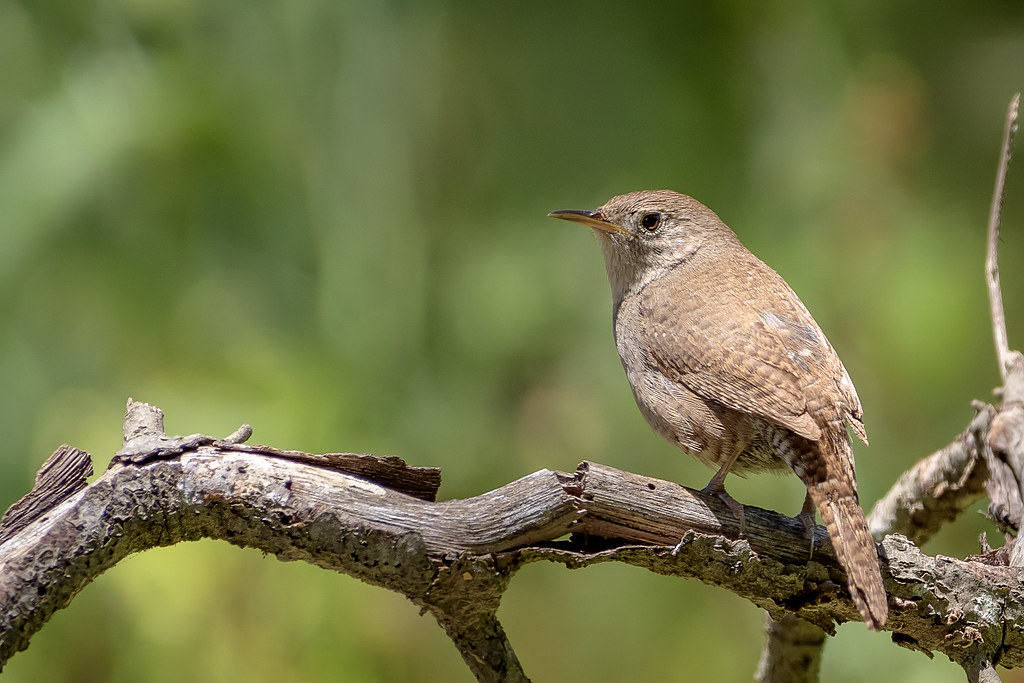
House Wrens, a native species in North America, aren’t usually as aggressive towards bluebirds as sparrows. But, wrens are very territorial and will sometimes enter a bluebird nest box to destroy some or all of the eggs. They usually do this by piercing the eggs with their long beak. If this happens, the bluebirds might abandon their eggs.

Photo by Lisa Zins is licensed under CC BY 2.0
To avoid competition between wrens and bluebirds, a good rule of thumb is to mount bluebird houses 50-200 feet away from heavily wooded areas, which is the house wren’s preferred habitat.
5. The Eggs Are Poorly Incubated
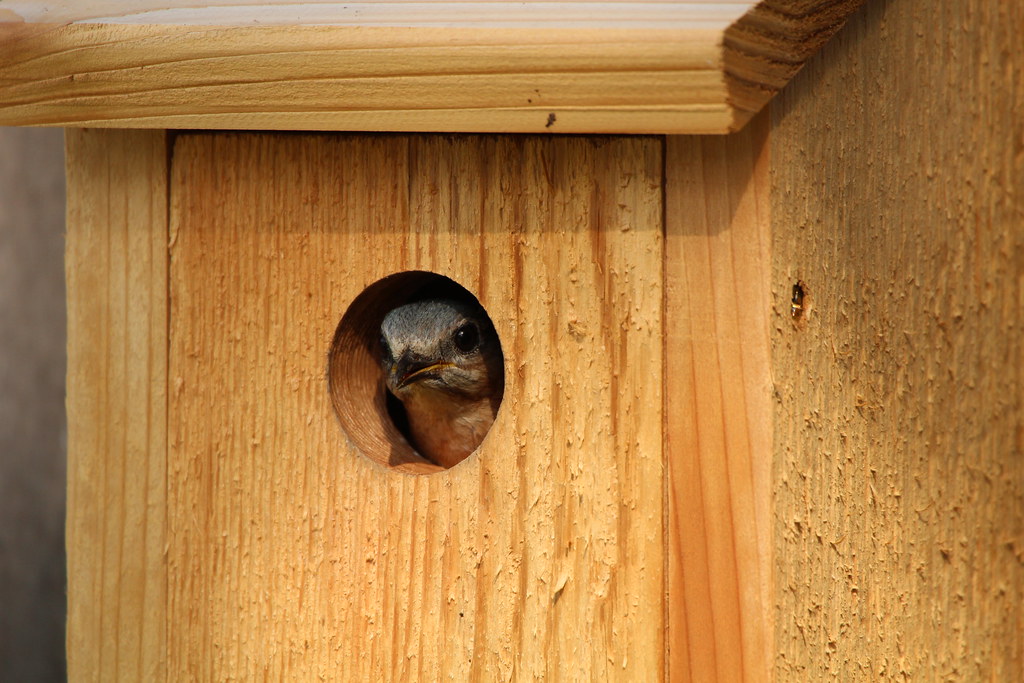
The last reason that bluebirds abandon their eggs is poor incubation. If the female gets up off the nest too many times while she’s incubating, the embryos within the eggs won’t develop enough to hatch. This can lead to abandonment.
Poor incubation can happen for a multitude of reasons. Perhaps the female is young and inexperienced. It could also be that there isn’t enough food around, so the female has to get up more often to hunt. Also, if humans monitor the nest box too often, it could disturb the female and keep her off the nest for too long.
To set your bluebirds up for a successful incubation, there are two things you can do: First, if insects seem scarce in your area, try offering live mealworms at your feeder. This will give the male bluebird a steady source of food that he can bring to the female while she’s sitting.
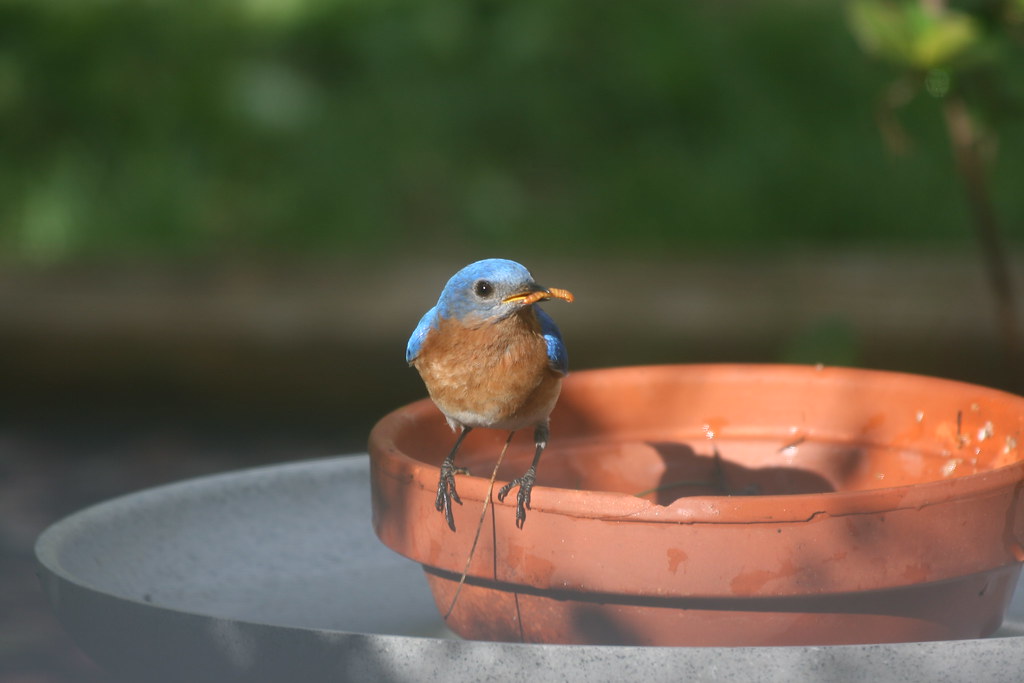
Photo by Connecticutbirder is licensed under CC BY-NC-ND 2.0
Second, while you should monitor the nest box regularly, DON’T open the box in the early morning or during periods of bad weather. These are the most important times to keep the nest box at a steady temperature and to encourage the female to keep incubating.
Conclusion
From the loss of an adult bird, to nest predation, to an overheated nest box, there are plenty of reasons bluebirds might abandon their eggs. We can’t always stop this from happening, but properly monitoring your nest box is key, so I hope you find the tips in this article to be helpful.
Thanks for visiting Bluebird Landlord! If you want to attract bluebirds to your own backyard, stick around, and check out the related articles below.

